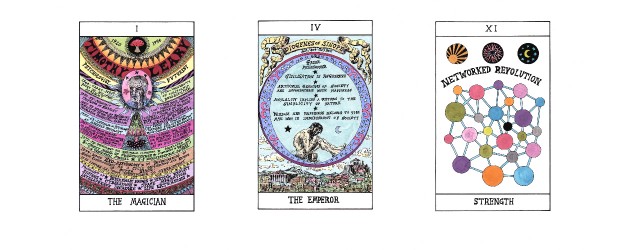HEXEN 2.0, 2009-2011
HEXEN 2.0, 2009-2011
The connections drawn within and among the cards are so mind-boggling to contemplate that it seems entirely appropriate to comprehend them within a magical system like the tarot.
The New York Times - Suzanne Treister: ‘Hexen 2.0’ - article by Ken Johnson, Jan. 31, 2013
HEXEN 2.0 is a collection of works consisting of alchemical diagrams, a Tarot deck, photo-text works, a video and a website.
The work specifically investigates the participants of the seminal Macy Conferences (1946-1953), whose primary goal was to set the foundations for a general science of the workings of the human mind. The conference united scientists across their disciplines. HEXEN 2.0 simultaneously looks at diverse philosophical, literary and political responses to advances in technology including the claims of Anarcho-Primitivism and Post Leftism, Theodore Kaczynski/The Unabomber, Technogaianism and Transhumanism, and traces precursory ideas such as those of Thoreau, Warren, Heidegger and Adorno in relation to visions of utopic and dystopic futures from science-fiction literature and film.
Treister’s diagrams can be understood as dense mindmaps exploring all these connections. Parts of it reemerge in a peculiar set of Tarot cards, designed by Treister. Traditionally, a set of Tarot cards consists of 78 cards: 22 which are by readers called the Major Arcana and which represent the grand themes of life, and 56 cards which make up the Minor Arcana, representing normal people and everyday events. In STUK, Treister’s Major Arcana is presented. Psychologist, futurist and advocate of therapeutic use of LSD, Timothy Leary takes the place of the Magician, while Aldous Huxley, author of Brave New World, becomes the Fool. Every card contains a wealth of information ready to be deciphered by the visitor.
A third element of this body of work which is presented in STUK, is the video. It shows the manipulated image of the participants of the conferences, as if they were taking part in a séance.
Together HEXEN 2.0 offers a unique view on modern intellectual and scientific history and the relation between different knowledge systems that developed throughout. It creates a space where one may use the works as a tool to envision possible alternative futures.
Suzanne Treister (UK)
°1958, London





